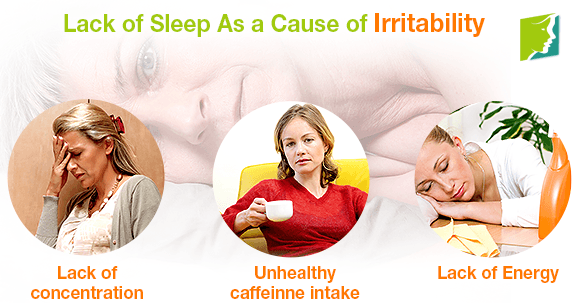Late nights at the office, a new baby in the family, hot flashes at all hours: there is a myriad of reasons why people don't get all the sleep they need. Sometimes, there just aren't enough hours in the day. Nocturnal rest, however, is actually a crucial component of a healthy lifestyle, and not getting enough of it can seriously affect daily life. Read on to discover how lack of sleep can increase irritability, as well as how the consequences can be felt throughout the day.
Lack of Energy
A good night of sleep gives the body time to recharge from the stress and physical exertion of the day. When that time is interrupted, it's common to get up already feeling run-down, and this can be the first step on the road to irritability. A general lack of energy can turn everyday tasks into chores, since they each take up extra time that could be spent on other things. Many feel frustrated at the thought of functioning at lower speeds, so this can start the day with a foul mood.
Lack of Concentration
Less energy makes concentrating on complicated tasks or activities much more difficult. Sleep deprivation can make it hard to focus on and synthesize important information, causing problems with workplace productivity as well as business and personal relationships. Disappointment with one's abilities can also cause tension that triggers frustration and irritability.
This is especially relevant to women going through menopause, because memory loss is another potential symptom of hormonal imbalance. Combined with sleep deprivation, levels of irritation can significantly increase.
Unhealthy Caffeine Intake
Perhaps surprisingly, irritability caused by too little sleep can manifest inwardly as well as outwardly, negatively affecting overall health. Caffeine is a common stimulant many use to perk up after a night of tossing and turning, but too much of it can form part of a vicious anxiety cycle. Studies have shown that four or more cups of coffee per day - more than 500 to 600 milligrams - can directly cause both insomnia and irritability.
The Flip Side
Just as sleep deprivation can set off anxiety, getting enough shut-eye can help fight against it. Seven to eight hours per night, as recommended for adults, can help the body meet each new day fresh and well-prepared. Enough sleep has all the opposite effects of the problems listed above: it strengthens the immune system for increased overall energy, gives the brain a chance to relax before processing more information, and renders caffeine completely unnecessary. A few nights in a row of uninterrupted sleep are often all it takes to see the difference.
Irritability caused by sleep deprivation depletes both physical and mental health, making it a real risk to general well-being. No matter how busy you become, it's important to remember to take time to rest your body so that time spent awake is as fulfilling as it can be. For more information about irritability and how to treat it, follow the links below.
Sources
- National Health Service UK. (2015). Self Help for Insomnia. Retrieved February 17, 2016, from http://www.nhs.uk/Conditions/Insomnia/Pages/Prevention.aspx
- National Institutes of Health. (2015). Caffeine in the diet. Retrieved February 17, 2016, from http://www.nlm.nih.gov/medlineplus/ency/article/002445.htm



